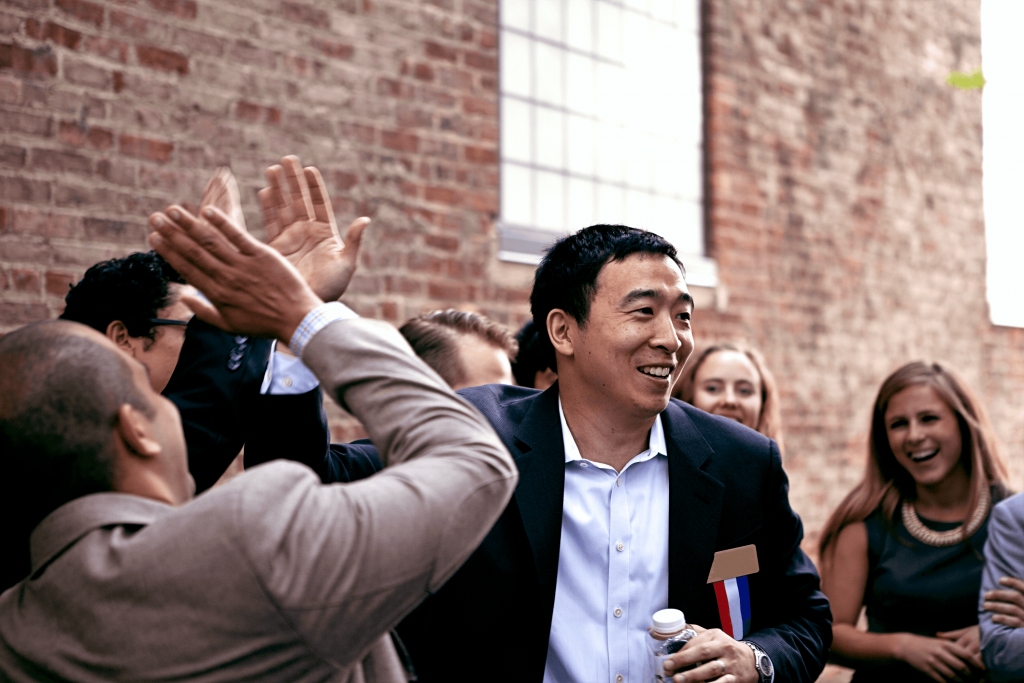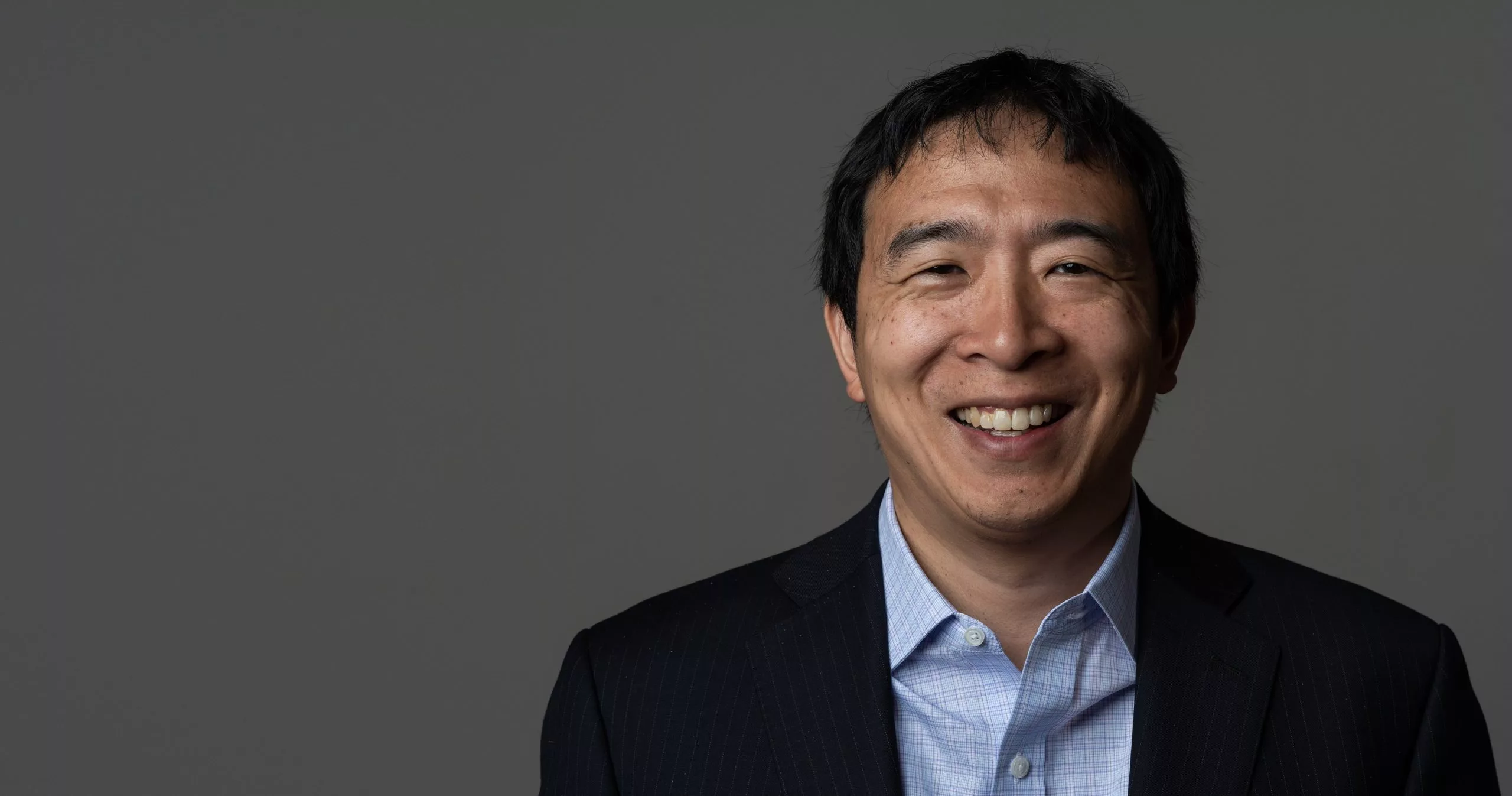When the Washington Post acquired Andrew Yang’s GMAT test preparation company in 2009, the former corporate attorney saw an opportunity to shift his career toward more meaning and purpose. He started by making a list of the problems he saw in the world. The one that animated him most: so much human talent heading to investment banks, management consulting firms, law firms, and big tech companies, rather than taking the lead in improving the human condition. He asked himself, “What would I want a young, ambitious, energetic person to take on instead?” His answer: helping a business grow or founding a company in a struggling city like Detroit, Baltimore, or New Orleans.
Starting in 2011, he channeled his dream into a nonprofit, Venture for America, that helps young people found or lead businesses in challenged communities. The organization thrived and helped create thousands of jobs. “But as much as I loved everything I was doing,” Yang says, “I came to realize that my efforts were like pouring water into a bathtub that has a giant hole at the bottom. We’re automating away millions of jobs, much faster than urban entrepreneurs can create them.”
Yang points to the automation of 4 million manufacturing jobs in Michigan, Ohio, Pennsylvania, Missouri, and Wisconsin — key swing states — as the reason Donald Trump won the election in 2016. “AI and automation are about to do the same thing to workers in retail, customer service, truck driving and transportation, fast food, and on and on throughout the economy,” he says.
Facing the reality that, as he puts it, “we’re going through the greatest economic technological transition in human history,” he once again asked himself what his role should be. His answer: a run for president in 2020, as a Democrat with a platform promoting a universal basic income and other measures that could help ease the inevitable pain of such a fundamental economic transformation. “I realized that our political establishment was not actually trying to address this central challenge,” he says. “They can barely talk about it. Most of them don’t understand it.”
He launched his campaign in February and in April published a book, his second, called The War on Normal People: The Truth About America’s Disappearing Jobs and Why Universal Basic Income Is Our Future. By June 30, his campaign had raised just over $355,000, according to the Federal Election Commission.
We caught up with Yang to discuss his predictions for the future of work, why he thinks a universal basic income (UBI) is the right solution, and his advice for conscious CEOs. “We need to rethink the way we distribute value and work in our society,” he says, “and we need to move as fast as possible, because we have perhaps five to 10 years before the truck drivers are sent home.”

When you say, “We’re shedding millions of jobs and we need to do something about it,” what kind of reactions do you get? Do people think you’re being apocalyptic?
Andrew Yang: There’s been a massive shift in the last six months. The consensus has reached a point where a lot of institutions and organizations agree that the change coming to our economy is different than any previous shifts we’ve experienced. McKinsey released a report saying that 30 percent of American jobs will be subject to automation by 2030. Bain & Co. put out a similar report, calling it “the Great Transformation” and predicting 20 to 25 percent of jobs to be lost in the same timeframe. Bain also concluded that we would need to absorb labor at four times the rate of the industrial revolution in order to successfully manage the transition. The president of MIT came out and said, “The purpose of MIT now is to help society prepare.”
And it’s not just truck-driving jobs and retail jobs that are going to be automated. Software makes it very, very possible to automate many jobs that have previously been considered white collar. We’re already seeing this with the reduction of the number of bookkeepers in the workforce. Accountants, lawyers, radiologists, pharmacists — many of these roles can be automated.
There are massive problems coming down the pike. And if you look at the numbers, it’s no longer speculative. You actually see all the dystopian tropes coming true. We’re in the middle of them. I just met with a CEO of an advertising company who said that 80 percent of advertising jobs are being moved into algorithms and software. U.S. labor force participation rates are already down to 62.7 percent, the same level as El Salvador and the Dominican Republic. Seven Americans die of drugs every hour. Our suicide rates have spiked, contributing to an overall decline in life expectancy, which is unheard of in a developed country. More Americans are on disability right now than working in construction. All you have to do is dig into the numbers.
One of the struggles is that people are daunted by what this means because the solutions tend to be very big and dramatic, and so people are reluctant to directly confront them.
Right. It’s one thing to believe there’s a problem, but then the next question is, what to do about it. Tell us more about how you got from noticing this “giant hole in the bathtub” to the platform you’re running on and your solution.
AY: When you read books about the future of work — The Second Machine Age by a couple of MIT professors, Rise of the Robots by Martin Ford — they all end up mentioning universal basic income, because they feel that the disruption is going to be massive.
But the book that really pushed me over the top was a book by Andy Stern, who used to run one of the largest labor unions in the country, the SEIU . He wrote a book called Raising the Floor, where he said that the future of labor is no labor, and that we are screwed and we must move to a new way of people receiving value. He advocated for a universal basic income of $1,000 per adult per month.
I found his argument very powerful because it was no longer technologists saying, “We’re going to automate the jobs away.” Of course a technologist might think that. But then we have someone who is the biggest labor union leader of our time saying, “Yes, we’re going to automate jobs away.” Someone who literally argued for decades about the central role of labor. When someone like that comes around and says, “We need to move toward universal basic income,” I find that very compelling. He is now an advisor and supporter to my campaign.
So, what is a universal basic income? How does it work? Why is it a good idea? And particularly from the point of view of a CEO or a business leader, what does it mean for businesses?
AY: Universal basic income is a policy where every citizen receives a certain amount of money — free and clear, no questions asked — to meet basic needs.
My plan is the Freedom Dividend, where every American adult gets $1,000 a month. There are so many good things about it for businesses and CEOs. Everyone who runs a business knows that capitalism and markets function much, much better when consumers have money to spend. If we were to give everyone $1,000 a month, the consumer economy would be much more robust and vital, and businesses would have significantly more customers to serve. The Roosevelt Institute found that giving everyone $1,000 a month would increase buying power by more than $2 trillion per year and grow the economy by 12 percent while creating 2.5 million new jobs.
It’s that Henry Ford idea of people being able to afford the product you’re making, right? That’s the consumer side. But what does it mean as an employer if your employees are already getting $12,000 a year?
AY: It will free people up to do the work they want to do to, at a higher level. Their discretion will empower them to make better decisions about where to work. Anyone who’s in some sort of exploitative or abusive role will be more empowered to leave. I have a feeling that the CEOs who are reading this would end up being the beneficiaries of that, because more people would want to work for a company that’s trying to do things the right way.
It’s also a de facto raise for all of your employees. That relieves some pressure, because you’re trying to do the right thing by your workers, stakeholders, and community members, but at the same time, you have the constant pressure of maximizing the bottom line and operating as efficiently as possible. That is really the struggle. You have this system that’s designed to optimize for one variable: corporate profitability. Stock market prices, capital incentives, investment returns — it’s all geared toward this one variable.
I know. I’ve been a CEO. I ran a company. We had our values. We tried to be wholesome at every turn, and it was great. But we have to be honest about the way the capital markets work. The capital markets are going to concentrate the rewards in fewer and fewer hands over time, and it’s going to make it so that the natural incentives of companies are to serve people who have more buying power — unfortunately, it’s not going to be a majority of Americans. If you imagine a smoothed-out economy where more Americans had buying power, that enables companies to behave the way that, in my opinion, most of them would prefer to behave: trying to serve a broader group of people rather than catering to just a small slice of buying power.
So, how does UBI work? Where does this money come from?
AY: There are different ways to pay for it; my plan is to pay for it out of four mechanisms. The first is that we currently spend $500 billion to $600 billion a year on welfare programs, food stamps, disability, and the like. I would not touch those programs in terms of taking money away from them. If someone was already receiving benefits, they wouldn’t get an additional set of benefits. This does end up reducing the cost of the Freedom Dividend significantly, because millions of Americans are already receiving benefits, and we’re not necessarily just stacking them on top. It’s about 25 percent paid for before you do anything.
The second big move is that we need to join the rest of the industrialized world and implement a value-added tax. A value-added tax is a consumptive tax that also applies to different stages of production. Anybody who’s been to Europe has seen it on their receipt. It’s something like a revved-up sales tax that isn’t just on the final sale. The reason this is so important is that the current income-based system will not capture the gains of automation or artificially-intelligent software and machines. The beneficiaries of those changes tend to be very big tech companies that move all of their earnings through Ireland or someplace where they don’t have to pay a lot of taxes. The reason why every other industrialized country has a value-added tax is because it’s much more effective at harvesting revenue for the public. The American GDP is now up to a record $19 trillion, up $4 trillion in the last 10 years. That means a value-added tax of half the European level would generate about $800 billion.
The third thing is we would get another $500 billion or so in new revenue from economic growth, because if you grow the consumer economy by $2 trillion, the government would get back about $500 billion. Lastly, we currently spend over $1 trillion in healthcare, incarceration, homelessness services, and other costs that would go down significantly if you were to give everyone $1,000 a month. It gets very, very expensive for society when people rely on our institutions. If you can keep people functional, that would reduce our costs. One study found that if we were to alleviate child poverty in this country, it would add $700 billion to GDP per year because you’d have higher graduation rates, higher mental health, higher productivity, and fewer health problems among children and young adults.
That’s how you pay for it. The great thing — and many, many CEOs know this — is that if you invest in people, it ends up paying off. That’s what we need to do throughout our society.
$12,000 a year is not that much. That’s not a middle-class standard of life.
AY: It’s not intended to be a middle-class standard of life or a job replacement. The current poverty line in the United States is $12,770. It’s not even going to get you to the poverty line. It’s a balance — or a cushion, a supplement, a transition fund. Right now, if you’re a server in a restaurant and you make $18,000 a year, and I give you an additional $12,000 a year, you’re unlikely to quit your job. If you keep your job, you get the equivalent of a 66 percent raise, and you’ll be able to take your kid out to a movie, repair your car, perhaps even save a bit of money.
You don’t want a universal basic income to be at such a high level that it completely transforms the labor market. So, $1,000 a month is enough to make a huge difference in the lives of tens of millions of Americans and make our labor market much more dynamic. People will be able to move for opportunities and perhaps seek new training more realistically. But it’s not so much that people will significantly change their labor force participation.
A UBI is not supposed to replace a job, yet we need to replace a lot of jobs, right? So, how does a universal basic income solve for this technological revolution? Why is it what we need in the face of this coming change?
AY: The goal is to build a new kind of economy. If you imagine the extreme where everyone has buying power, then you end up reorganizing to a more community-based, human-centered economy that would be, in many ways, supplemental to the large-scale automation of jobs that’s happening on the other end.
This is the first big transitional step. We’re on this path now where about 44 percent of American jobs could conceivably be automated over the next 15 to 20 years. What we need to do is help the economy transition in a direction where people will be able to do work that they care about and are excited about and passionate about in ways that add value to the community. The goal is to transition toward what I call something of an “artisanal-plus economy.”
Imagine a town of 50,000 people where a factory may close over the coming years. If you start giving everyone $12,000 a year right now, that town would have an additional $60 million in consumer power per year — which would result in a proliferation of consumer-facing businesses like bakeries, restaurants, or tutoring services, that sort of thing. Those stores are never going to become globally competitive with Amazon or Walmart, but they could still serve vital purposes in their communities.
What common objections do you hear when you present the idea of a universal basic income?
AY: One is that we can’t afford it. It’s ridiculous. Our economy is enormous. GDP is $19 trillion. This is very, very affordable. Another is that it would cause inflation, and there’s no reason to think it would. We printed $4 trillion for the banks with no meaningful inflation, as one example. And to the extent there is inflation in our economy right now, it tends to revolve around healthcare, education, and housing — all of which have distinct factors that are driving up costs. Then, there’s the “people are going to do bad things” argument. The data just doesn’t show that.
Those are the objections people tend to have, but as a neuroscientist once told me, the main obstacle to a universal basic income is the human mind. We’re programmed to see resources as scarce. This seems too good to be true, so we start searching for objections and obstacles. In a democracy, there’s absolutely nothing stopping us from giving ourselves the dividend. This passed the House of Representatives in 1971 under Richard Nixon. Dr. Martin Luther King, Jr. was for it. A thousand economists signed a letter saying it’s great for the economy and society. A version of it has been active in Alaska for 36 years, and it’s wildly popular.
If we just woke up to the possibility that we could make this happen, then we could make it real. We could alleviate untold human misery that’s totally pointless and easily addressed. We would improve children’s nutrition, graduation rates, and mental health. We would reduce domestic violence, depression, and hospital visits. We would end up creating so much value. The whole thing is, really, that we just need to start believing it’s possible. I know where we’re heading if we don’t do a universal basic income. To me, it’s something we must do if we want to stay whole, functional, and prosperous as a society.
What’s your call-to-action for conscious business leaders? What can they do if they agree with you, or if they want to learn more?
AY: I want CEOs of conscience to come clean and say, “The economy is changing, and we need to think much bigger about what the possible solutions are, because saying that companies should tweak training programs and try to maintain staffing levels is not a genuine solution.” It’s not intrinsically your responsibility to, for example, employ and train lots of people who don’t currently work for your company. That’s one of the pressures that people put on these CEOs. If you can get the job done with fewer people, somehow there’s this idea that you should still find something for those people to do. I want CEOs to admit publicly, “Within the current construction of capitalism, there are real limits to what even a very, very conscientious CEO can do,” because it always comes back to the numbers.
What we need to do, together, is make the case that we need to evolve to the next form of capitalism. What I mean, aside from universal basic income, is that we need new measurements that will reward companies for taking actions that help improve society. Instead of just GDP, which we made up during the Great Depression, we should measure societal progress through things like childhood success rates, mental health and freedom from substance abuse, median income and wealth, environmental quality, the proportion of elderly in quality care, and quality-adjusted life expectancy. Then, if any companies made an investment that drove results in a positive direction on one of those metrics, it would actually count on their bottom line. There would actually be a dollar value associated with it.
We have to free corporate CEOs from the tyranny of having one set of numbers that they optimize for, and then everything else is just window dressing. And we need CEOs to make that case. We need CEOs to stop pretending that you can optimize for profits and do everything else, too. If conscious CEOs get together, we really ought to be able to change this thing.





